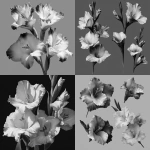Explore the Best AI Image Gallery

Quantum Computing Breakthroughs: A New Era for Creativity and Technology
Quantum computing is paving the way for revolutionary advancements in numerous fields, raising exciting possibilities for creativity and technology. As traditional computing reaches its limits, quantum mechanics provides a new pathway—one that harnesses the power of superposition and entanglement to process information in ways that classical computers cannot.
The Basics of Quantum Computing
At its core, quantum computing leverages the principles of quantum mechanics to perform computations. Unlike bits in classical computing, which exist as either 0 or 1, quantum bits, or qubits, can exist in multiple states at once. This unique capability enables quantum computers to tackle complex problems more efficiently, potentially revolutionizing fields such as cryptography, materials science, and even medical research.
Impact on the Creative Industry
The creative sector stands to benefit immensely from the breakthroughs in quantum computing. Here are some potential ways quantum technology could enhance creative practices:
- Enhanced Virtual Environments: Quantum computing can help create highly detailed and complex virtual environments for video games and simulations. By allowing for greater realism, artists and developers can push the boundaries of what is possible in interactive design.
- Improved Algorithms for Art Creation: Quantum algorithms could lead to novel methods for generating art or music, providing artists with powerful tools to explore new forms of creative expression.
- Advanced Data Analytics: For sectors like film and design, quantum computing could optimize marketing strategies by analyzing viewer preferences at an unprecedented scale, enabling creators to tailor their content to audiences more effectively.
- Material Innovation: In fashion and product design, quantum computing can accelerate the discovery of new materials, allowing designers to create innovative, sustainable products that are impossible to manufacture with classical computations.
Potential Uses Beyond Creativity
The implications of quantum computing extend far beyond the arts. Industries like finance, transportation, and healthcare are eagerly awaiting its adoption. For example:
- Financial Modeling: By rapidly simulating various market conditions and risk scenarios, quantum computers could enhance trading strategies and portfolio management.
- Drug Discovery: Quantum computing can model molecular interactions incredibly efficiently, significantly accelerating the development of new medications and treatments.
- Supply Chain Optimization: Companies could optimize their logistics and inventory management systems through advanced simulations of supply chain dynamics.
Ethical Considerations
With great power comes great responsibility. As quantum computing technology unfolds, ethical dilemmas will arise. One critical issue is quantum security. As quantum computers can potentially break widely used encryption methods, this poses significant risks to data privacy. The transition to quantum-resistant encryption algorithms will be essential to safeguard sensitive information.
Moreover, there’s a potential digital divide that may develop between those who have access to quantum computing technology and those who do not. This inequality might exacerbate existing disparities in creativity and innovation access across different groups and regions.
Future Trends in Quantum Computing
The future of quantum computing is bright, with continuous advancements on the horizon. Major tech companies and startups are investing millions into developing quantum hardware and software solutions, heralding a new wave of innovation.
One of the emerging trends is the integration of quantum computing with artificial intelligence (AI). Combining AI's data processing capabilities with quantum computing's power could yield unparalleled advancements across various fields, from art generation to complex simulations.
Additionally, hybrid quantum-classical computing models are gaining traction. These systems utilize quantum processors to solve specific parts of a problem while relying on classical computing for others, effectively bridging the gap until quantum technology becomes mainstream.
Conclusion
Quantum computing signifies a monumental leap in technology with the potential to alter the creative landscape significantly. As we continue to explore its applications, we must navigate the ethical considerations and ensure that this powerful technology is used to foster inclusivity and creativity rather than division. The future of quantum computing holds endless possibilities, and its role in shaping innovation is only beginning to unfold.















](https://images.ai-img.art/thumbnails/150/ffdc3aeb085cdd89cb67916c26208f25e7c7b0250ad6e5877b48414760697a90.webp)




](https://images.ai-img.art/thumbnails/150/477a6a01318cd965f7f5f6ecc623f70e7e61f0004811369ce0977db761aecd57.webp)


](https://images.ai-img.art/thumbnails/150/08baaaca8d12502f281846feba6b0cf89edf106843ff56346812f5eec39eeed1.webp)















](https://images.ai-img.art/thumbnails/150/6b15b97ffd39aeb1b066fd2c8b33c1a2dd03a3966282ec6508e2c2c205c0360f.webp)



](https://images.ai-img.art/thumbnails/150/0791636c23fa42b3fd87dbe2541b7d3047cdb4d5fc0dab19f4efcfe1439963da.webp)
](https://images.ai-img.art/thumbnails/150/916a8f2aa9c13d051af4ab588a4921732f41e144150bdfc78853a28500cd717d.webp)




